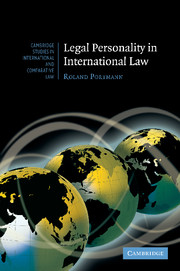Book contents
- Frontmatter
- Contents
- Foreword
- Acknowledgments
- Table of Cases
- List of Abbreviations
- Introduction
- Part I The concept of personality in international law
- 1 Notion
- 2 Conceptions
- 3 Significance
- Part II The conceptions of personality in international law: their origins and legal manifestations
- Part III A framework for personality in international law
- Bibliography
- Index
- Titles in the series
- References
1 - Notion
Published online by Cambridge University Press: 05 October 2010
- Frontmatter
- Contents
- Foreword
- Acknowledgments
- Table of Cases
- List of Abbreviations
- Introduction
- Part I The concept of personality in international law
- 1 Notion
- 2 Conceptions
- 3 Significance
- Part II The conceptions of personality in international law: their origins and legal manifestations
- Part III A framework for personality in international law
- Bibliography
- Index
- Titles in the series
- References
Summary
Legal personality is a controversial concept of international law. But it is, of course, not a concept confined to the international legal system. It represents one of the pillars of municipal law as well. In order to approach the meaning of the notion, it is therefore convenient to review the function of personality in municipal private law. A private law analogy might help to develop an understanding of the role of the concept in international law. Yet, at the same time, it is important to note the peculiarities of international personality. It is because of them that the concept poses much more difficult legal issues in international law than in municipal law. These differences are also the reason why a private law analogy can only help to demonstrate the problem, but not to find a solution for the controversial concept of personality in international law.
A legal system has to determine whom it endows with the rights and duties contained in it and whose actions it takes account of by attaching legal consequences to them. To this effect, municipal law usually includes a law of persons. Historically, this law of persons was concerned with marking several distinctions in the legal personality of individuals. It comprised classes like nobles, clerics, serfs or slaves to which it allocated different degrees of personality in law. Most of these distinctions vanished from the private law of persons in the nineteenth century. Yet, it did not become obsolete.
- Type
- Chapter
- Information
- Legal Personality in International Law , pp. 7 - 12Publisher: Cambridge University PressPrint publication year: 2010

